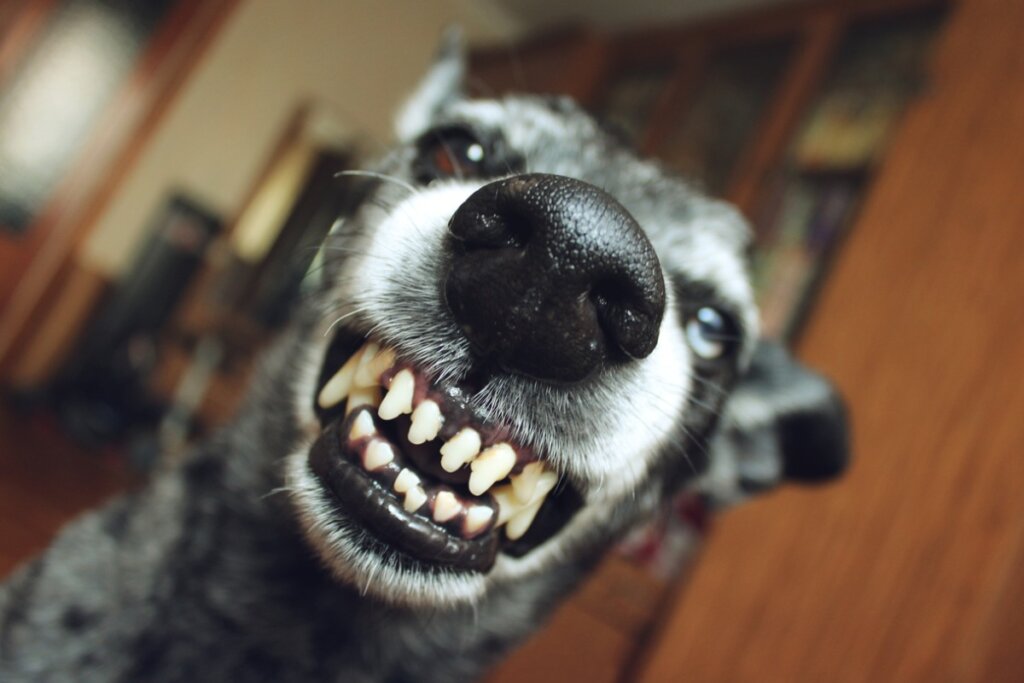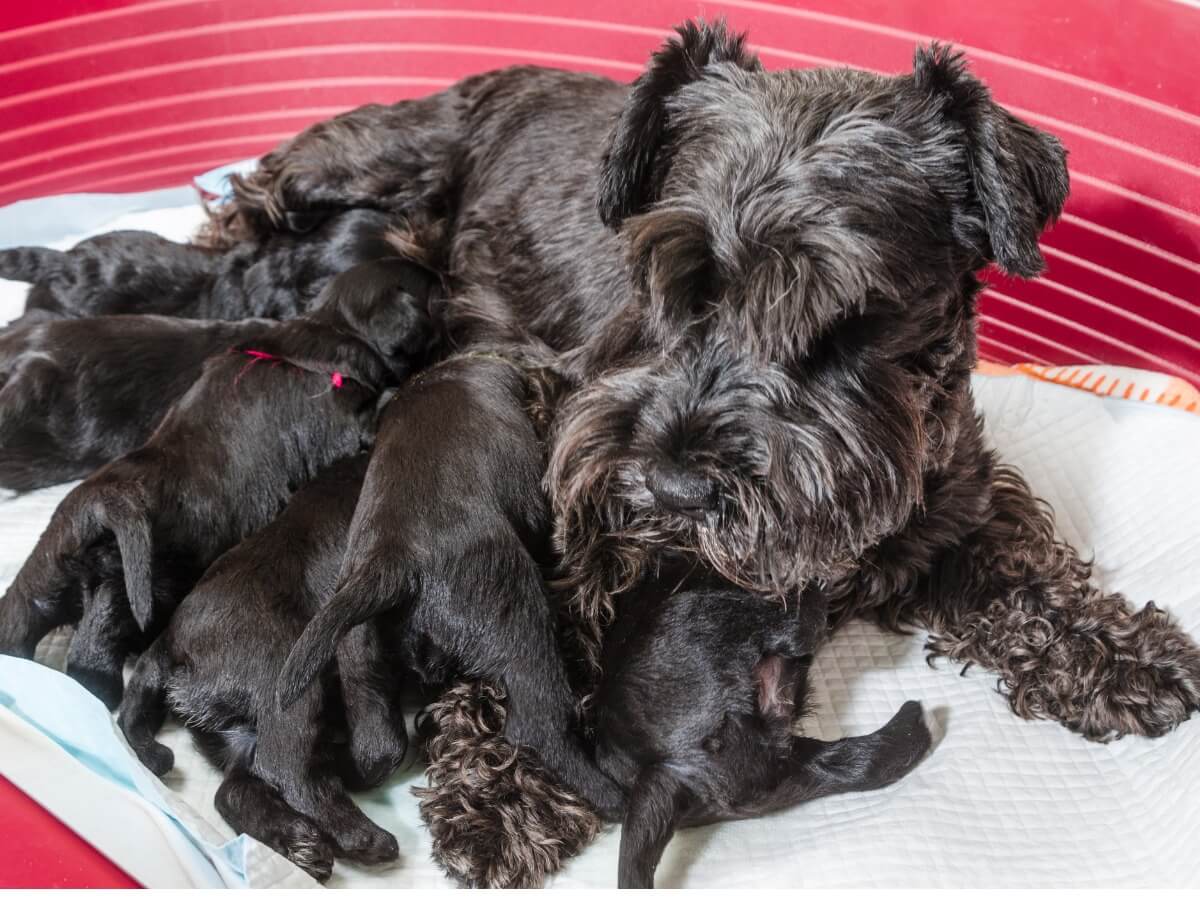The Reason Why Your Dog Growls At or Bites Her Puppies

Bringing a litter of puppies home is as exciting as it is laborious. If this is also your first time dealing with the miracle of canine life, you may well encounter behaviors you don’t understand. One such example is if your dog growls at or bites her puppies without warning.
Although female domestic dogs have great maternal instincts, they can also exhibit behavioral problems in this area, just like any mother. If you want to understand this behavior better and find a solution to it, here’s everything you need to know, so don’t miss it.
The maternal instinct of female dogs
The maternal instinct is present in all species that provide parental care to their offspring. In the case of dogs, the most distinctive feature is how protective the mother is of her puppies: she always keeps them by her side and doesn’t usually let anyone get close to them.
In addition, puppies are totally dependent on the mother until they’re 2 weeks old, which is when they start to develop their senses. Until this time, the bitch will keep them warm, nurse them and lick them to groom them and stimulate their digestive system, otherwise they wouldn’t have bowel movements.
In the wild, the mother would have to focus on the stronger cubs, leaving the weaker ones aside to economize her breeding efforts.
During the puppies’ third and fourth week of life, they become more independent and the weaning period begins. When they’re able to move on their own and eat solid food, their mother will be their guide to learn how to socialize and forage for food.
You might be interested in: 17 Things a Puppy Needs

My dog growls or bites her puppies. Why?
Maternal instinct is neither inevitable nor obligatory. In all species, there are mothers who reject their offspring. Although it isn’t common in the case of female dogs, you might find that your dog growls or bites her puppies, or even tries to eat or kill them.
While this seems like a horrible idea on the surface, in the wild it isn’t that unusual, as raising a litter of puppies is difficult and costly for the mother.
If your dog shows this aggression towards her puppies, you must find the underlying cause and fix it. In the following sections, we bring you the most common reasons why the mother might behave like this.
1. She’s a first-timer
A dog that has given birth for the first time in her life may not understand what is happening to her, no matter how much maternal instinct she has. It’s relatively common to see first-time mothers reject puppies or even attack them.
If the puppies were born by cesarean section, their mother may not understand where they came from and reject them, as she hasn’t followed the natural process of cutting the umbilical cord and cleaning them.
At first, unless she tries to kill them, this isn’t a cause for concern if the female rejects her pups. After a few days, she should come to terms with the situation and take care of them without any problem.
2. Pain or illness
It’s easy to identify if the bitch is being aggressive with the puppies because of a health problem. In these cases, rejection usually occurs when they approach, or try to suckle or touch her. Whenever maternal care behavior is altered, possible pathologies should be ruled out. The most common are the following:
- Mastitis: The lowering of the mother’s defenses after birth can cause an infection in the breasts. When the puppies try to feed, they cause physical pain to the dog and she may become aggressive.
- Pyometra: This same lowering of defenses can also cause an infection in the uterus and accumulation of pus.
- Preeclampsia or eclampsia: This disease consists of a drop in calcium prior to delivery or during lactation. It causes convulsions, high fever and uncoordinated movements. Because of this malaise, the dog may neglect her puppies.
3. Instinct and training of the mother
The maternal instinct is nothing more than a series of genetic guidelines to guarantee to a certain extent the perpetuity of the species. This assumes that the dog will have certain behaviors that she doesn’t need to learn, but she may simply not have a maternal instinct.
On the other hand, a dog that has been raised in a home with humans lacks the teachings of other females in her pack. The only thing she has to take care of her puppies is her instinct and this might be insufficient.
4. They have a different smell
One of the reasons why you should never interfere during a birth is because at this time the female dog forms a special bond with her puppies through their sense of smell. Therefore, if a person touches the pups with their bare hand, they’ll leave traces of their “scent” on the puppy’s body, which will cause the mother to consider the puppy an “intruder” and growl at them.
5. It’s weaning time
The age at which puppies can be separated from their mother is after two months of age. If, for some reason this process doesn’t take place and the mother continues to nurse her pups, it’s normal for her to become aggressive and bark at her puppies when they try to get close to her breasts.
This is a natural behavior that shows the puppies they should begin to fend for themselves. However, it isn’t commonly observed, because, in most cases, people separate the little ones from their mother before it happens.
6. She’s trying to teach her puppies
This reason is a little different from the previous ones, but it can also be one of the reasons why a dog growls at or bites her puppies. As mentioned above, the mother is in charge of teaching the dogs to socialize during their first weeks of age. For this reason, in an attempt to correct their behavior, she may growl or bark at her pups.
Contrary to the previous reasons, in this case, the mother only scolds her pups as a warning, so no type of rejection towards them is detected. In fact, after showing this behavior, she’ll continue to take care of her puppies without any problem.
What do I do if my dog growls or bites her puppies?
If the puppies’ lives are in danger, the first thing to do is to separate them from the mother. In this case, you’ll have to take care of the puppies until the problem is solved.
Read more here: 8 Things a Puppy Should Learn in its First Year
On the other hand, if the dog growls at or bites her puppies out of simple rejection and doesn’t do anything to them, you can try to help her to accept them with the help of a professional. However, this is a delicate process and isn’t always recommended.
The dog will also need psychological assistance, as giving birth may have been a traumatic event for her.

Finally, it’s imperative that, during the whole process of gestation, birth, and lactation, a veterinary follow-up is carried out. A health problem in these stages may not only provoke aggressive behavior towards the offspring, but could also compromise the mother’s life.
All cited sources were thoroughly reviewed by our team to ensure their quality, reliability, currency, and validity. The bibliography of this article was considered reliable and of academic or scientific accuracy.
- Puppy Development: Stages from Birth to Two Years Old. (s. f.). Best Friends Animal Society. Recuperado 23 de septiembre de 2021, de https://resources.bestfriends.org/article/puppy-development-stages-birth-two-years-old
- Domínguez Fernández de Tejerina, J. C., Peña Vega, F. J., & Castro LLamazares, B. (1994). Parto y distocias en la perra y en la gata. Clínica veterinaria de pequeños animales, 14(4), 0223-241.